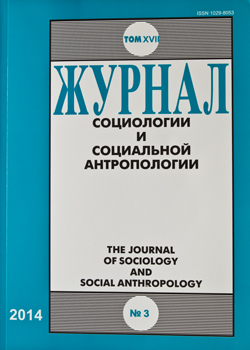The Influence of Social Capital on Health in Europe
Keywords:
health differences, Europe, social capital, social networks, generalized trust, European Social Survey 2008, two-level linear modeling
Abstract
The article addresses the problem of the influence of social capital on health in different social contexts. Data of the European Social Survey 2008 (representative samples of the population of 28 countries) and statistics of the World Bank and the WHO were analyzed using statistical methods of two-level linear modeling. The results show that subjective health is not significantly connected with the stocks of individual “structural” capital - connections of respondent with other people and voluntary associations. Social connections do have a positive effect on health in relatively less developed European countries (with lower GDP per capita and state expenditure on health and higher corruption level), but it disappears after statistical control for social demographic variables (gender, age, education and perception of well-being) due to a greater influence on health of social demography and deficiency of this capital in elderly people and lower social strata. The public resources of structural capital, i.e. prevalence in the society of social networks and citizen’s associations, also do not influence health - nor directly nor through interaction with its individual stocks. Cultural (attitudinal) social capital, as we have found, is more important for health. Analysis demonstrates that trust of the individual in other people creates prerequisites for improvement of his health, and impact of this variable on health amplifies as a country moves in the direction of post-modernization.
Published
2014-02-20
How to Cite
Rusinova, N., & Safronov, V. (2014). The Influence of Social Capital on Health in Europe . ZHURNAL SOTSIOLOGII I SOTSIALNOY ANTROPOLOGII (The Journal of Sociology and Social Anthropology), 17(3), 112–133. Retrieved from http://jourssa.ru/jourssa/article/view/661
Section
Sociology of Health

